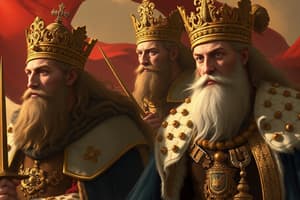Podcast
Questions and Answers
What does dynastic succession in monarchy entail?
What does dynastic succession in monarchy entail?
- The monarch is elected by the public.
- The monarch appoints a successor from a different family.
- The throne is inherited by the monarch's child or relative. (correct)
- The throne is passed to military leaders.
What was the primary belief of the Conservative Whigs?
What was the primary belief of the Conservative Whigs?
- All citizens should share equal power in politics.
- A ruling class of a few privileged families should govern. (correct)
- Increased democratic participation in government.
- Government should be led by a broad coalition.
According to political theory, what is essential for the survival of a republic?
According to political theory, what is essential for the survival of a republic?
- Civic virtue and an educated citizenry. (correct)
- Military strength and leadership.
- A group of aristocrats to guide the people.
- Absolute power in the hands of a monarch.
How did George Washington exemplify the ideals of the new republic?
How did George Washington exemplify the ideals of the new republic?
What was the Society of the Cincinnati exclusively composed of?
What was the Society of the Cincinnati exclusively composed of?
What does the legal status of 'coverture' signify for married women?
What does the legal status of 'coverture' signify for married women?
What did Abigail Adams request from her husband regarding the new laws?
What did Abigail Adams request from her husband regarding the new laws?
What did radical Whigs advocate for regarding political participation?
What did radical Whigs advocate for regarding political participation?
What argument did Judith Sargent Murray make about education for women?
What argument did Judith Sargent Murray make about education for women?
What was the concept of republican motherhood?
What was the concept of republican motherhood?
Which statement reflects a racial perspective during the revolutionary era?
Which statement reflects a racial perspective during the revolutionary era?
What role did Mercy Otis Warren play during the revolutionary era?
What role did Mercy Otis Warren play during the revolutionary era?
How did the Revolution affect traditional women's roles?
How did the Revolution affect traditional women's roles?
What was a common result of racial attitudes during the Revolution?
What was a common result of racial attitudes during the Revolution?
What contradiction exists regarding Thomas Jefferson and slavery?
What contradiction exists regarding Thomas Jefferson and slavery?
Which virtue was associated with women in the context of the separate domestic sphere?
Which virtue was associated with women in the context of the separate domestic sphere?
Flashcards are hidden until you start studying
Study Notes
Monarchy and Dynastic Succession
- Monarchy relies on dynastic succession, where the throne is inherited by the monarch's child or relative.
- Contested succession led to ongoing conflicts and warfare throughout Europe.
- In the 18th century, established monarchs were viewed as protectors and guides for their subjects.
Political Ideologies in the 18th Century
- Conservative Whigs advocated for governance by a patrician class, limiting leadership to a small number of privileged families.
- Radical Whigs pushed for increased popular participation in politics and the expansion of democracy.
Republicanism and Civic Virtue
- A successful republic requires citizens to practice virtuous behavior; corruption among citizens can lead to its downfall.
- The survival of the republic in the United States was contingent on civic virtue and an educated populace.
- George Washington exemplified the ideals of the new republic, declining monarchical power and returning to civilian life at Mount Vernon.
Society of the Cincinnati
- Founded in 1783, the Society of the Cincinnati, with Washington as its first president general, included only Continental Army and French officers, excluding militias.
- The society reflected an aristocratic belief that military service qualified individuals as guardians of public virtue.
Gender and Legal Status
- Married women's legal status was defined by coverture, limiting their economic and legal independence from their husbands.
- Abigail Adams advocated for women's rights in her correspondence with John Adams, urging him to consider women's needs in legislative matters.
Influential Women of the Revolutionary Era
- Mercy Otis Warren opposed British policies pre-war and published works advocating for independence.
- Judith Sargent Murray pushed for women's educational opportunities and economic independence, questioning gender inequality in education.
Changes in Women's Roles
- The Revolution challenged traditional roles for women, expecting them to uphold republican virtues in the domestic sphere.
- The concept of republican motherhood emphasized women's responsibility in raising virtuous children to ensure the republic's survival.
Slavery and Racial Attitudes
- By the Revolution, slavery had existed in America for over a century, reinforcing racial hierarchies.
- Views of the new nation as a White republic contributed to increased racial hatred during the Revolution, particularly against Black individuals seeking freedom.
- Despite authoring the Declaration of Independence, Thomas Jefferson enslaved over a hundred people, granting freedom to only a few.
Studying That Suits You
Use AI to generate personalized quizzes and flashcards to suit your learning preferences.




